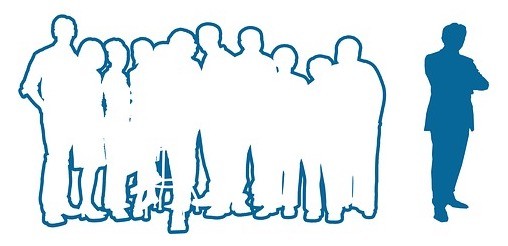I thought I had an OK work relationship but...
Erika Andersen, Founder/Partner
Dear Office Politics,
I have worked in a high-stress but free-wheeling media office for more than 20 years, and am good at my job, have OK people skills and am generally respected. I received a promotion about a year ago. However, since moving into a particular department (mostly other women) about 10 years ago, I’ve apparently stepped on a few toes because I don’t quite fit in with the group and have, on a couple of occasions, voiced my opinions on ethical issues that have cropped up. As a result, a couple of co-workers are cool to me, rarely speak to me and exclude me from non-work conversations. A couple more who are close to those two are also quite cool. The rest are neutral (or so I thought).
 I recently met with the guy who heads up this department (I’m actually his peer but have three employees, while he has about 10) and, in the course of the meeting, tried to defuse a comment I’d made at another meeting (he wasn’t there) about his department but which I was pretty sure someone had repeated to him. My comment was accurate and fair, but one he would not welcome. I thought that went OK but, on speaking to him about something else the other day, discovered that he had misinterpreted my attempt to defuse the situation, was really angry about my remark and basically saw my comment (or maybe me) as negative and mean-spirited.
I recently met with the guy who heads up this department (I’m actually his peer but have three employees, while he has about 10) and, in the course of the meeting, tried to defuse a comment I’d made at another meeting (he wasn’t there) about his department but which I was pretty sure someone had repeated to him. My comment was accurate and fair, but one he would not welcome. I thought that went OK but, on speaking to him about something else the other day, discovered that he had misinterpreted my attempt to defuse the situation, was really angry about my remark and basically saw my comment (or maybe me) as negative and mean-spirited.
I thought I had an OK work relationship with this man, and am devastated to discover that when I said, “There are a few clouds in the sky,” he heard, “There’s a nasty Force 10 hurricane about to destroy our city.”
We talked about all this and he apologized for overreacting to my comment. A similar thing occurred with another co-worker last week—someone told her I’d said something that I hadn’t said in that case, and she basically believed the worst of me. I’ve come to the unhappy conclusion that I have become the scapegoat, or disliked co-worker, for this group of people, and I’m pretty upset about it. I support a spouse and child, make good money, am about 15 years from retirement and there are few opportunities in my rather specialized line of work hereabouts.
I’ve tried to network with the more supportive people in this group but it is tough sledding, as most of them have their own longtime work buddies and no one is “unattached.”
My inclination is to go turtle—just go to work, do my job, cultivate the other more receptive people elsewhere in the office, speak as little as possible and accept that my relationship with these folks will never be warm and fuzzy. Help!
The Lonely Scapegoat
OFFICE-POLITICS ADVISER ERIKA ANDERSEN
Dear Scapegoat,
It sounds like you’re really at a loss about how to establish better relationships with your colleagues. I have some advice for you—but you may not want to hear it. So, take a deep breath and jump in.
You’ve described a pattern, one where you’re saying and doing things that evoke negative reactions from co-workers—and you’ve said it’s happened repeatedly over time.
And now you’ve decided that it’s their problem: “I’ve come to the unhappy conclusion that I have become the scapegoat, or disliked co-worker, for this group of people.”
What you’ve done is very common. Because it’s painful to think that a problem exists because of something we’ve done, we let ourselves off the hook by putting responsibility for the problem on someone else. Unfortunately, it usually doesn’t work: a mentor of mine once taught me that until you acknowledge your own contribution to a problem, you are powerless to solve it.
Let’s pretend for a moment that it’s not their problem—that they haven’t all just somehow decided to make you the bad guy. Let’s pretend it’s your problem: that you’re consistently behaving in ways that don’t work for others, that upset them and make them want to retreat from you. Yikes. Hard to acknowledge. BUT—and this is key—the good news is; if it’s your behavior, you can do something about it.
Here’s my recommendation: I believe you may be the ideal candidate for executive coaching. You’re good at your job and are generally respected. And you are clearly well-intentioned. But you are having a negative impact on people for reasons that are mysterious to you. Working with a coach could help you connect the dots. In most coaching situations, you’d get clear and balanced objective feedback how others perceive you: what people see as your strengths and weaknesses. Then your coach will work with you to figure out what to do about it; new skills or approaches you can learn and use that will work better for you and others. With a coach, if you can acknowledge your contribution to the problem, he or she can support you in addressing it.
I hope this is helpful to you…please let us know what happens. Thanks for writing to OfficePolitics.com.
Warmly,
Erika Andersen, Author
